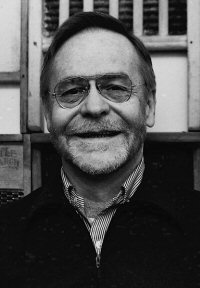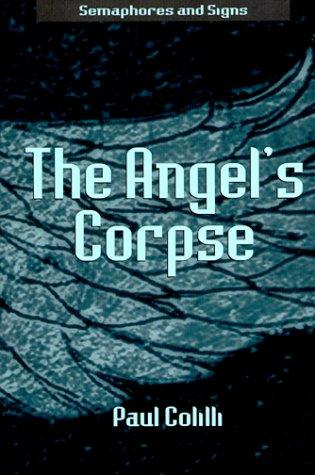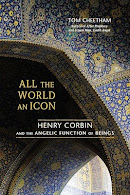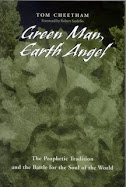"...the Imagination (or love, or sympathy, or any other sentiment) induces knowledge, and knowledge of an 'object' which is proper to it..."
Henry Corbin (1903-1978) was a scholar, philosopher and theologian. He was a champion of the transformative power of the Imagination and of the transcendent reality of the individual in a world threatened by totalitarianisms of all kinds. One of the 20th century’s most prolific scholars of Islamic mysticism, Corbin was Professor of Islam & Islamic Philosophy at the Sorbonne in Paris and at the University of Teheran. He was a major figure at the Eranos Conferences in Switzerland. He introduced the concept of the mundus imaginalis into contemporary thought. His work has provided a foundation for archetypal psychology as developed by James Hillman and influenced countless poets and artists worldwide. But Corbin’s central project was to provide a framework for understanding the unity of the religions of the Book: Judaism, Christianity and Islam. His great work Alone with the Alone: Creative Imagination in the Sufism of Ibn ‘Arabi is a classic initiatory text of visionary spirituality that transcends the tragic divisions among the three great monotheisms. Corbin’s life was devoted to the struggle to free the religious imagination from fundamentalisms of every kind. His work marks a watershed in our understanding of the religions of the West and makes a profound contribution to the study of the place of the imagination in human life.Search The Legacy of Henry Corbin: Over 800 Posts
Wednesday, August 31, 2011
Angels In-Between
Angels In-Between: The Poetics of Excess and the Crisis of Representation by Cosma, Ioana, Ph.D., UNIVERSITY OF TORONTO , 2009, 296 pages; NR72375 PDF HERE
From the Abstract: This dissertation examines the reconfiguration of the limits of representation in reference to the intermediary function of angels. The Modernist engagement with the figure of the angel entailed, primarily, a reconsideration of the problem of representation as well as an attempt to trace the contours of a poetics that plays itself outside the mimetic understanding of representation. My contention is that this transformation of literary referentiality was not simply a disengagement of art from reality but, rather, from the truth-falsity, reality-fiction, subject-object dichotomies. The angel, defined as the figure of passage par excellence , but also as the agency that induces the transformation of the visible in the invisible and vice versa, appears both as a model/archetype and as a guide towards the illumination of this intermediary aesthetic. Working with the joined perspectives from angelology, contemporary phenomenology, and poetics, this dissertation is an extended overview of the notion of intermediary spaces, as well as an attempt to probe the relevance of this concept for the field of literary studies.
Thanks to Hadi Fakhoury for pointing out this dissertation which was co-supervised by Paul Colilli and relies extensively on Corbin.
From the Abstract: This dissertation examines the reconfiguration of the limits of representation in reference to the intermediary function of angels. The Modernist engagement with the figure of the angel entailed, primarily, a reconsideration of the problem of representation as well as an attempt to trace the contours of a poetics that plays itself outside the mimetic understanding of representation. My contention is that this transformation of literary referentiality was not simply a disengagement of art from reality but, rather, from the truth-falsity, reality-fiction, subject-object dichotomies. The angel, defined as the figure of passage par excellence , but also as the agency that induces the transformation of the visible in the invisible and vice versa, appears both as a model/archetype and as a guide towards the illumination of this intermediary aesthetic. Working with the joined perspectives from angelology, contemporary phenomenology, and poetics, this dissertation is an extended overview of the notion of intermediary spaces, as well as an attempt to probe the relevance of this concept for the field of literary studies.
Thanks to Hadi Fakhoury for pointing out this dissertation which was co-supervised by Paul Colilli and relies extensively on Corbin.
Tuesday, August 30, 2011
Ronald Johnson - A Poetry of the Imaginal
Of Johnson's major long poem Ross Hair writes,
"Johnson's sense of cosmos in ARK pertinently echoes the ideas expressed by the depth-psychologist James Hillman in his essay "Alchemical Blue." According to Hillman: "The world is as we see it in our dreams and poems, visions and paintings, a world that is truly a cosmos, cosmetically adorned, an aesthetic event for the senses because they have become instruments of imagining." Like Hillman, ARK posits the world as "an aesthetic event for the senses" whose multifarious phenomena provide the eclectic "instruments of imagining" which offer insight and revelation about the nature and mysteries of the universe." See Hair's essay and his book-length study of Johnson.
Johnson's books include:
The Book of the Green Man, WW Norton, 1967 (available online here)
ARK, Living Batch Press, 1996 - to be reissued in 2011 by Flood Editions.
To Do As Adam Did: Selected Poems of Ronald Johnson, Talisman House, 2000
The Shrubberies - Flood Editions, 2001. Reviewed here in Jacket2
Radi Os, Flood Editions, 2005
Also indispensible is
Ronald Johnson: Life and Works, Edited by Joel Bettridge and Eric Murphy Selinger, National Poetry Foundation, 2008
A wide variety of links to poetry, interviews & resources from Peter O'Leary here.
O'Leary's recent interview discusses Johnson and is well worth attention for many reasons.
Wednesday, August 24, 2011
Corbin & Lubac
I have this interesting bit of news from Daniel Proulx:
"Talem eum vidi qualem capere potui.
Cette idée n’est peut-être pas directement de Corbin puisque je viens de
trouver que Henri de Lubac donne la citation exacte dans Aspect du
bouddhisme de 1951. La date de la publication de ce livre de Lubac
concorde avec la première occurrence dans l’œuvre de Corbin. De plus,
Lubac indique clairement le rapport au docétisme! J’en conclus que
Corbin utilise de Lubac comme source de cette citation des Actes de
Pierre, mais qu’il ne la nomme pas!"
Lubac citation is here:

Monday, August 22, 2011
Thursday, August 11, 2011
Esotericism & Mysticism Conference in Russia
Call for Papers 2011
Association for the Study of Esotericism and Mysticism
in collaboration with:
Russian Christian Academy for Humanities (Saint-Petersburg),
H. S. Skovoroda Institute of Philosophy (National Academy of Sciences of Ukraine)
Ukrainian Association of Religion Researchers
Research Center for Mysticism and Esotericism (St. Petersburg, Russia)
Fifth International Conference
Mystic and Esoteric Movements in Theory and Practice
HISTORY AND DISCOURSE
Historical and Philosophical Aspects of
the Study of Esotericism and Mysticism
December 2 – 5, 2011 - St Petersburg (Russia)
Keynote lecture:
Dr. Prof. Wouter J. Hanegraaff
Association for the Study of Esotericism and Mysticism
in collaboration with:
Russian Christian Academy for Humanities (Saint-Petersburg),
H. S. Skovoroda Institute of Philosophy (National Academy of Sciences of Ukraine)
Ukrainian Association of Religion Researchers
Research Center for Mysticism and Esotericism (St. Petersburg, Russia)
Fifth International Conference
Mystic and Esoteric Movements in Theory and Practice
HISTORY AND DISCOURSE
Historical and Philosophical Aspects of
the Study of Esotericism and Mysticism
December 2 – 5, 2011 - St Petersburg (Russia)
Keynote lecture:
Dr. Prof. Wouter J. Hanegraaff
Wednesday, August 10, 2011
Goethe & Jung
Given Corbin's affinity for the German Romantic Tradition and his close association with Jung, this volume, and the other work of Paul Bishop, may well be of interest to readers of this blog.
Tuesday, August 9, 2011
"Iranian philosophy and comparative philosophy" reprinted
From the Iran Book News Agency - A new edition of "Iranian philosophy and comparative philosophy" written by Henry Corbin will be published. The book has been published in 1990 by Iranology assembly of France and Tous publication. DETAILS HERE
Monday, August 8, 2011
ASE 2012 Conference Call for Papers
ASE 2012 Conference Call for Papers
Association for the Study of Esotericism
Fourth International Conference
Call for Papers: Esotericism, Religion, and Culture
June 14-17, 2012
The Association for the Study of Esotericism (ASE) is seeking paper and panel proposals for its fourth International North American Conference on Esotericism to be held at the University of California, Davis.
Sunday, August 7, 2011
Saturday, August 6, 2011
Paul Colilli - The Angel's Corpse
The Angel's Corpse, Paul Colilli, 1999.
Search text at amazon.
Colilli bases his work in very large measure on Corbin. Loaded with citations. I was unaware of his work. Thanks yet again to Hadi Fakhoury for the reference.
"With the great merit of Aristotle's Poetics, poetic logic became a theoretical activity endowed with a philosophical nature allowing it to be more philosophical than the pure representation of existence. Today, however, the theoretical status of poetic logic has been greatly demoted. The Angel's Corpse restores to poetic logic (or lyric philosophy) the cognitive and epistemological significance attributed to it by Aristotle. The Angel's corpse (the central metaphor in this restoration) is a sign-post beyond which there exists an uncharted terrain of human signification. This terrain is expressed in terms of lyric philosophy and its universal trait is a shocking into reawakening, which is linked to the dissolution of the repetitive logic of history. With this book, Colilli aims to bring to life the traits that are close to the Angel and which amount to a new philosophy of culture and interpretation. This philosophy is free from the ideological burden of previous systems, but pivots its cognito-epistemological premises on the idea of reawakening."
Search text at amazon.
Colilli bases his work in very large measure on Corbin. Loaded with citations. I was unaware of his work. Thanks yet again to Hadi Fakhoury for the reference.
"With the great merit of Aristotle's Poetics, poetic logic became a theoretical activity endowed with a philosophical nature allowing it to be more philosophical than the pure representation of existence. Today, however, the theoretical status of poetic logic has been greatly demoted. The Angel's Corpse restores to poetic logic (or lyric philosophy) the cognitive and epistemological significance attributed to it by Aristotle. The Angel's corpse (the central metaphor in this restoration) is a sign-post beyond which there exists an uncharted terrain of human signification. This terrain is expressed in terms of lyric philosophy and its universal trait is a shocking into reawakening, which is linked to the dissolution of the repetitive logic of history. With this book, Colilli aims to bring to life the traits that are close to the Angel and which amount to a new philosophy of culture and interpretation. This philosophy is free from the ideological burden of previous systems, but pivots its cognito-epistemological premises on the idea of reawakening."
Friday, August 5, 2011
Le combat pour l'ange - Unpublished texts by Corbin
Le Combat pour l’Ange (Ricerche sulla filosofia mazdea)
di Henry Corbin
(In Italian)
On Google Books
Le Combat pour l’Ange (ricerche sulla filosofia mazdea) è la traduzione italiana di un testo inedito di Henry Corbin, filosofo e orientalista tra i più importanti dello scorso secolo. L’opera, recentemente ritrovata fra le carte conservate nell’archivio dello studioso francese, è il frutto di uno studio dedicato alla figura di Zarathustra, nel corso del quale l’autore cerca di delineare con precisione i tempi e i luoghi della predicazione del profeta mazdeo, gli aspetti mistico-religiosi del suo messaggio di fede, e, infine, la diffusione e la rivalorizzazione della dottrina zoroastriana sia nell’ambito della spiritualità orientale, sia in quello della storia del pensiero occidentale. Non si tratta, però, di un’opera di sola erudizione; in essa, infatti, l’ampio numero di documenti testuali presi in considerazione viene interpretato a partire da un suggestivo metodo esegetico, che ha il merito di riportare alla luce i tesori spirituale tramandati e custoditi, nel corso dei secoli, negli scritti di questa antica e affascinante tradizione.
Raphael Ebgi, nato a Faenza nel 1984, si è laureato in Filosofia presso l’Università San Raffaele di Milano, dove sta ora ultimando il suo dottorato di ricerca in Metafisica. Allievo di Massimo Cacciari e Giulio Busi, i suoi studi si concentrano attorno al problema della rivalorizzazione filosofica del pensiero poetico-simbolico attuata in epoca rinascimentale. Tra i suoi lavori L’infinito intorno. Studio sul Sofista di Platone, Alboversorio, Milano 2007 e la curatela dell’edizione critica del De Ente et Uno di Giovanni Pico della Mirandola, Bompiani, Milano 2010.
Marco Giacalone, nato a Bergamo nel 1986, si è laureato in Filosofia presso l'Università Vita e Salute San Raffaele con una tesi sulla ‘scienza del mito’ in autori quali Schelling, Eliade, Kerényi e Jesi. Lavora attualmente alla tesi specialistica, presso l'Università di Torino, sulla Pancapadika, opera di Padmapada, allievo di Sankara, uno dei più grandi e noti filosofi e mistici del subcontinente. Ha trascorso due soggiorni di studio in India, a Thiravananthapuram, dove ha approfondito lo studio della lingua sanscrita e di alcune opere filosofiche nell’ambito dell’Advaita Vedanta. È codirettore della collana “Aevum viride” per le Edizioni Torre d’Ercole.
Sommario
Prefazione di Raphael Ebgi 1
Nota bibliografica di Marco Giacalone 5
Avvertenza 9
Le Combat pour l'Ange
Premessa 13
Introduzione 15
Parte prima: La ierofania dello spazio
1. Incertezze geografiche 21
2. Topologia liturgica 25
Parte seconda: La ierofania del tempo
3. Il Tempo cosmogonico 31
4. Cronologia sacrale 38
5. Il “Giorno dell’Angelo” 42
Parte terza: Angelofanie zoroastriane
6. Le visioni al Centro del mondo 51
7. L’angelologia fondamentale 61
8. Le Annunciazioni 66
9. Le Combat pour l’Ange 78
Parte quarta: Il mistero zoroastriano 87
10. Magi e Dervisci 89
11. Ierogamie 96
12. Liturgia d’estasi 113
Parte quinta: Le esegesi delle ierofanie mazdee nell’Iran islamico 125
13. Ishrāqīyūn 126
14. Sciiti 127
15. Sufi 131
16. Il cavaliere spirituale 133
Indice dei nomi 143
Thanks to Hadi Fakhoury & Daniel Proulx for this !!
di Henry Corbin
(In Italian)
On Google Books
Le Combat pour l’Ange (ricerche sulla filosofia mazdea) è la traduzione italiana di un testo inedito di Henry Corbin, filosofo e orientalista tra i più importanti dello scorso secolo. L’opera, recentemente ritrovata fra le carte conservate nell’archivio dello studioso francese, è il frutto di uno studio dedicato alla figura di Zarathustra, nel corso del quale l’autore cerca di delineare con precisione i tempi e i luoghi della predicazione del profeta mazdeo, gli aspetti mistico-religiosi del suo messaggio di fede, e, infine, la diffusione e la rivalorizzazione della dottrina zoroastriana sia nell’ambito della spiritualità orientale, sia in quello della storia del pensiero occidentale. Non si tratta, però, di un’opera di sola erudizione; in essa, infatti, l’ampio numero di documenti testuali presi in considerazione viene interpretato a partire da un suggestivo metodo esegetico, che ha il merito di riportare alla luce i tesori spirituale tramandati e custoditi, nel corso dei secoli, negli scritti di questa antica e affascinante tradizione.
Raphael Ebgi, nato a Faenza nel 1984, si è laureato in Filosofia presso l’Università San Raffaele di Milano, dove sta ora ultimando il suo dottorato di ricerca in Metafisica. Allievo di Massimo Cacciari e Giulio Busi, i suoi studi si concentrano attorno al problema della rivalorizzazione filosofica del pensiero poetico-simbolico attuata in epoca rinascimentale. Tra i suoi lavori L’infinito intorno. Studio sul Sofista di Platone, Alboversorio, Milano 2007 e la curatela dell’edizione critica del De Ente et Uno di Giovanni Pico della Mirandola, Bompiani, Milano 2010.
Marco Giacalone, nato a Bergamo nel 1986, si è laureato in Filosofia presso l'Università Vita e Salute San Raffaele con una tesi sulla ‘scienza del mito’ in autori quali Schelling, Eliade, Kerényi e Jesi. Lavora attualmente alla tesi specialistica, presso l'Università di Torino, sulla Pancapadika, opera di Padmapada, allievo di Sankara, uno dei più grandi e noti filosofi e mistici del subcontinente. Ha trascorso due soggiorni di studio in India, a Thiravananthapuram, dove ha approfondito lo studio della lingua sanscrita e di alcune opere filosofiche nell’ambito dell’Advaita Vedanta. È codirettore della collana “Aevum viride” per le Edizioni Torre d’Ercole.
Sommario
Prefazione di Raphael Ebgi 1
Nota bibliografica di Marco Giacalone 5
Avvertenza 9
Le Combat pour l'Ange
Premessa 13
Introduzione 15
Parte prima: La ierofania dello spazio
1. Incertezze geografiche 21
2. Topologia liturgica 25
Parte seconda: La ierofania del tempo
3. Il Tempo cosmogonico 31
4. Cronologia sacrale 38
5. Il “Giorno dell’Angelo” 42
Parte terza: Angelofanie zoroastriane
6. Le visioni al Centro del mondo 51
7. L’angelologia fondamentale 61
8. Le Annunciazioni 66
9. Le Combat pour l’Ange 78
Parte quarta: Il mistero zoroastriano 87
10. Magi e Dervisci 89
11. Ierogamie 96
12. Liturgia d’estasi 113
Parte quinta: Le esegesi delle ierofanie mazdee nell’Iran islamico 125
13. Ishrāqīyūn 126
14. Sciiti 127
15. Sufi 131
16. Il cavaliere spirituale 133
Indice dei nomi 143
Thanks to Hadi Fakhoury & Daniel Proulx for this !!
Thursday, August 4, 2011
Additions to the Bibliography
Thanks to the excellent Hadi Fakhoury I have these citations which I should put in the bibliography sometime, but make available here in case I don't get to it. Many are new (to me) and a few I knew of seemed worth flagging again:
Baubérot, Arnaud. “La revue Hic et Nunc: Les jeunes-turcs du protestantisme et l'esprit des années trente.” Bulletin de la Société de l’histoire du protestantisme français 149 (2003): 569-589.
Bos, Matthijs van den. “Transnational Orientalism: Henry Corbin in Iran.” Anthropos 100, no. 1 (2005): 113-125.
Brun, Jean. “Un missionnaire protestant: Henry Corbin.” Revue d’histoire et de philosophie religieuses 59, no. 2 (1979): 187-200.
Fenton, Paul B.. “Henry Corbin and Abraham Heschel.” In Abraham Joshua Heschel: Philosophy, Theology and Interreligious Dialogue, edited by Stanisław Krajewski and Adam Lipszyc, 102-111. Jüdische Kultur, Bd. 21. Wiesbaden: Harrassowitz, 2009.
Giuliano, Glauco. Il Pellegrinaggio in Oriente di Henry Corbin. Trento: La Finestra, 2003.
Hankey, Wayne J. One Hundred Years of Neoplatonism in France: A Brief Philosophical History. Published in a single volume with Levinas and the Greek Heritage, by Jean-Marc Narbonne. Leuven: Peeters, 2006. Online as pdf file.
Jambet, Christian. “Le Soufisme entre Louis Massignon et Henry Corbin.” In Consciousness and Reality: Studies in Memory of Toshihiko Izutsu, edited by Sayyid Jalāl al-Dīn Āshtiyānī, Hideichi Matsubara, Takashi Iwami, et al., 258-272. Leiden: Brill, 2000.
Mabille, Bernard. “L’absolution de l’absolu.” In L’Un et le multiple, Cahiers du Groupe d’Études Spirituelles Comparées No. 7, edited by Jean-Louis Vieillard-Baron and Antoine Faivre, 9-24. Paris: Archè Edidit, 1999.
Moncelon, Jean. “Louis Massignon et Henry Corbin.” In Louis Massignon et ses contemporains, edited by Jacques Keryell, 201-219. Paris: Karthala, 1997.
Neuve-Eglise, Amélie. “Hermeneutics and the Unique Quest of Being: Henry Corbin’s Intellectual Journey.” Journal of Shi’a Islamic Studies 2, no. 1 (2009): 3-26.
Pinto, Louis. “(Re)traductions: Phénoménologie et ‘philosophie allemande’ dans les années 1930.” Actes de la recherche en sciences sociales 145 (2002): 21-33.
Roclave, Pierre. “Louis Massignon et Henry Corbin.” Luqmān 10 (1994): 73-86.
Schmidtke, Sabine, ed. Correspondance Corbin-Ivanow: Lettres échangées entre Henry Corbin et Vladimir Ivanow de 1947 à 1966. Paris: Peeters, 1999.
Stauffer, Richard. “Henry Corbin Théologien Protestant.” In Cahier de l’Herne: Henry Corbin, edited by Christian Jambet, 186-191. Paris: L’Herne, 1981.
Baubérot, Arnaud. “La revue Hic et Nunc: Les jeunes-turcs du protestantisme et l'esprit des années trente.” Bulletin de la Société de l’histoire du protestantisme français 149 (2003): 569-589.
Bos, Matthijs van den. “Transnational Orientalism: Henry Corbin in Iran.” Anthropos 100, no. 1 (2005): 113-125.
Brun, Jean. “Un missionnaire protestant: Henry Corbin.” Revue d’histoire et de philosophie religieuses 59, no. 2 (1979): 187-200.
Fenton, Paul B.. “Henry Corbin and Abraham Heschel.” In Abraham Joshua Heschel: Philosophy, Theology and Interreligious Dialogue, edited by Stanisław Krajewski and Adam Lipszyc, 102-111. Jüdische Kultur, Bd. 21. Wiesbaden: Harrassowitz, 2009.
Giuliano, Glauco. Il Pellegrinaggio in Oriente di Henry Corbin. Trento: La Finestra, 2003.
Hankey, Wayne J. One Hundred Years of Neoplatonism in France: A Brief Philosophical History. Published in a single volume with Levinas and the Greek Heritage, by Jean-Marc Narbonne. Leuven: Peeters, 2006. Online as pdf file.
Jambet, Christian. “Le Soufisme entre Louis Massignon et Henry Corbin.” In Consciousness and Reality: Studies in Memory of Toshihiko Izutsu, edited by Sayyid Jalāl al-Dīn Āshtiyānī, Hideichi Matsubara, Takashi Iwami, et al., 258-272. Leiden: Brill, 2000.
Mabille, Bernard. “L’absolution de l’absolu.” In L’Un et le multiple, Cahiers du Groupe d’Études Spirituelles Comparées No. 7, edited by Jean-Louis Vieillard-Baron and Antoine Faivre, 9-24. Paris: Archè Edidit, 1999.
Moncelon, Jean. “Louis Massignon et Henry Corbin.” In Louis Massignon et ses contemporains, edited by Jacques Keryell, 201-219. Paris: Karthala, 1997.
Neuve-Eglise, Amélie. “Hermeneutics and the Unique Quest of Being: Henry Corbin’s Intellectual Journey.” Journal of Shi’a Islamic Studies 2, no. 1 (2009): 3-26.
Pinto, Louis. “(Re)traductions: Phénoménologie et ‘philosophie allemande’ dans les années 1930.” Actes de la recherche en sciences sociales 145 (2002): 21-33.
Roclave, Pierre. “Louis Massignon et Henry Corbin.” Luqmān 10 (1994): 73-86.
Schmidtke, Sabine, ed. Correspondance Corbin-Ivanow: Lettres échangées entre Henry Corbin et Vladimir Ivanow de 1947 à 1966. Paris: Peeters, 1999.
Stauffer, Richard. “Henry Corbin Théologien Protestant.” In Cahier de l’Herne: Henry Corbin, edited by Christian Jambet, 186-191. Paris: L’Herne, 1981.
Wednesday, August 3, 2011
Mervin, Sabrina (Ed.). The Shia Worlds and Iran. London: Saqi, 2010
From Africa to Asia, there are areas that are home to minority and in some cases majority groups of Twelver Shia. Geography and history place Iran at the centre of these Shia worlds, but to what extent can we speak of an 'Iranian model' that these groups follow? This volume presents the Shi'a worlds in all their complexities and explores the tenuous relations between these groups and Iran. It also sheds light on little-known communities such as the Ironi Shi'a of Uzbekistan, and refines our understanding of groups studied more extensively like the Shia's in Iraq. Published in association with the Institut Francais du Proche-Orient.
AUTHOR BIO: Sabrina Mervin has been the co-director of the IISMM (Paris), from 2008 to January 2011 and is a senior researcher at the CNRS.
AUTHOR BIO: Sabrina Mervin has been the co-director of the IISMM (Paris), from 2008 to January 2011 and is a senior researcher at the CNRS.
Tuesday, August 2, 2011
Miscellany
Some Henry Corbin citations...
On the globalization of Sohravardi...
On Jacques Replat & the imaginal...
A note on Hierohistory...
On the globalization of Sohravardi...
On Jacques Replat & the imaginal...
A note on Hierohistory...
Subscribe to:
Posts (Atom)













